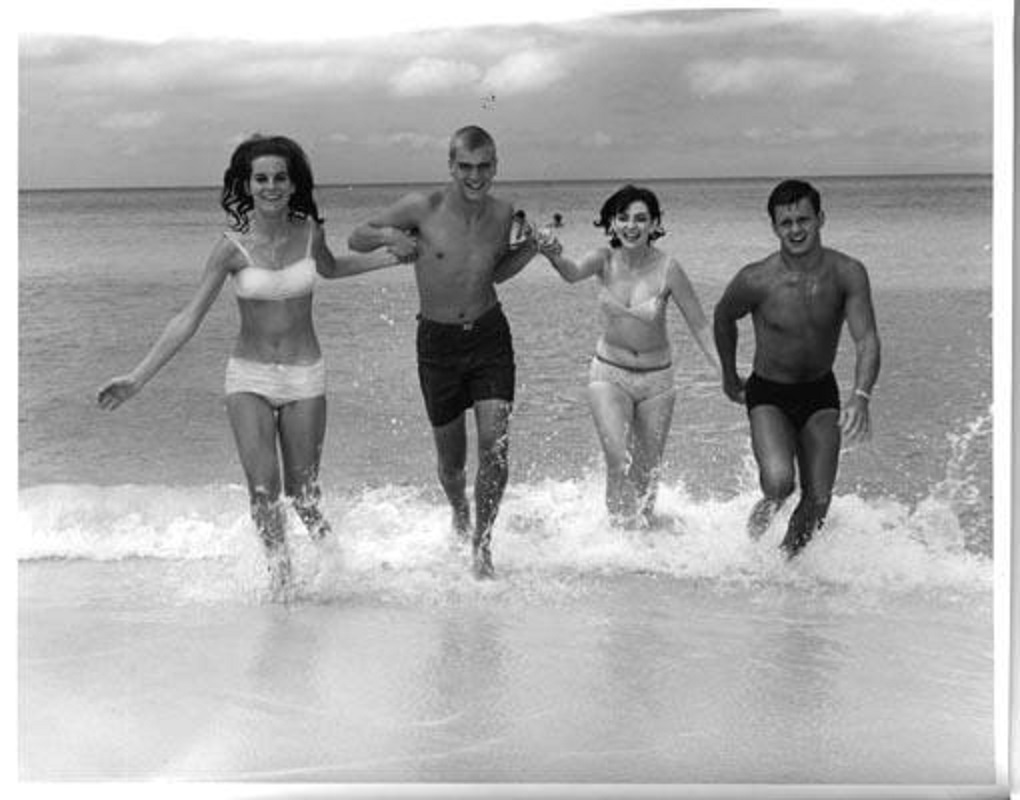“Panama City Beach has truly evolved into a successful year-round destination for all ages. We want to thank all our residents and visitors for 80 years running.” – Dan Rowe, Visit Panama City Beach President and CEO.
A developer named Gideon Thomas saw the beauty of Panama City Beach and on May 2, 1936, had “the foresight to establish a community based on tourism, rather than agriculture.” His resort included amusement park rides, restaurants and the first hotel, which was aptly named the Panama City Beach Hotel.
Please Read: TripAdvisor Ranks Panama City Beach as Top Ten Beach in USA..
Thomas had seashells trucked in from Apalachicola to “pave” a road from U.S. 98 to the Gulf shore, and Thomas Drive still bears his name.
Major highlights and breakthroughs over the years have included:
The Hathaway Bridge
In 1929, with the opening of the Coastal Highway (now U.S. 98) and the Hathaway Bridge, the land connection was made to those beautiful white-sand beaches to the west of Panama City. That ended the ferry rides, boat rides, or that long drive around West Bay to get there.
Jetties
Until the new pass was cut in 1934, the channel from the Gulf of Mexico into St. Andrews Bay was too shallow for large boats and steamers to enter far enough inside the bay to dock. To make St. Andrews Bay a viable port for business interests, a project was approved by the Army Corps of Engineers to widen and deepen the entrance channel to St. Andrews Bay.
Work was done from 1935 to 1937 to make this approach channel that was to be 450 feet wide and 29 feet deep, and protected by two jetties, each approximately 100 feet long. At that time there were no roads to the spot of the construction, so workers had to make a 6 mile boat trip each way to get to work every day. The many tons of marble and granite were transported from Birmingham and Sylacuaga, Alabama by train to Bay Harbor. From there the materials were transported by barge to the job site.
During early 1937 a short railroad, approximately 3,100 feet long, was built from the west beach to the jetties to facilitate work on this project. This is still touted as the only marble channel in the world.
Long Beach
- E. Churchwell continued to build his empire, which is remembered today as Long Beach Resort. The development there grew to include cottages, a casino, a restaurant, amusement rides, a skating rink, mini golf, a barber shop, a grocery store, a gas station, a souvenir shop, a shooting gallery, Petticoat Junction, Ghost Town, and, of course, the Hang Out.
Amusement Parks
Long time visitors and residents will joyfully remember the amusement parks with their rides and iconic and often gigantic fiberglass constructions. Goofy Golf is the only still standing attraction from the old days. It was built and remains almost the same as on the day it first opened in 1959.
Churchwell family’s Petticoat Junction amusement park, and Lee Koplin’s Tombstone Territory were both named after popular TV shows. What would become the Miracle Strip Amusement Park had begun some time after World War II.
Recreational Fishing
The tradition of recreational fishing is intrinsically linked with Florida’s identity. The number of saltwater anglers in Florida exceeds that of any other state in the nation. During 1999, an estimated 2.4 million anglers went on 19.5 million saltwater recreational fishing trips.
In Bay County, 31,737 saltwater fishing licenses were sold to non-residents in the fiscal year 1999-2000. It put Bay County on fourth place in a top ten list of other Florida Counties.
Condominium and Hotel Boom
The early days catered to the local, small, family-owned and operated hotels, motels and cottages. During the 70s and 80s the tourism industry continued to develop with new and more modern hotels and condominiums. Today it has become a year round premiere destination for millions of visitors from all over the world.
To meet the growing demand to attract tourists, a Bed Tax Referendum was passed in 1986 and the Bay County Tourist Development Council was formed. In 1998, the Panama City Beach Convention and Visitors Bureau was formed, and contracted with the TDC to perform tourism promotion, which remains the same today. The CVB has worked through the leadership of the Board of Directors to market Panama City Beach as a resort destination and their efforts have paid off with new development of hotels, condominiums, restaurants, retail stores and year round events.
Northwest Florida Beaches International Airport
In the early years of Bay County, several private airports operated followed by a municipal airport operated by the city of Panama City. Northwest Florida Beaches International Airport opened May 23, 2010 with service provide by Delta and Southwest Airlines. The airport was an integral part of the previously approved West Bay Sector Plan formulated to develop a large tract of land surrounding West Bay. The airport is operated by an Airport Authority established by the Florida Legislature with representation by members from Panama City, Panama City Beach and the counties of Bay and Walton.
